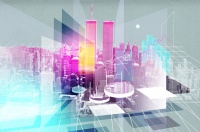Bleeding Edge Reviews
Review aggregators
Reviews
Please add any relevant reviews as they come in. Blog reviews are fine as long as they're substantial and more than a few paragraphs.
09/14/13 The Telegraph - Tim Martin: "Bleeding Edge, Pynchon’s eighth novel, is the best and most surprising thing he’s written since those great books. It dispels any suggestion that, after spawning an entire tradition of comic-digressive and shamelessly intellectual American novels, he had gone peacefully off the boil when he reached his seventies. [...] But now, 50 years after the publication of Pynchon’s debut novel, Bleeding Edge is at a stroke his 9/11 book, his internet book and – even though it’s set in 2001, back when the suggestion that the state was spying 24/7 on its citizens was still tinfoil-hat speculation rather than vivid reality – the first great fictional work of the post-PRISM age." Entire review »09/14/13 The Boston Globe - John Freeman: "In the pantheon of Pynchon books, which are either skybound – V. Gravity’s Rainbow, Against the Day — or earthly — Vineland, Inherent Vice — this one is decidedly of the latter sort. It’s a book that fights mightily against the landfill by taking all the random pieces of that wastrel-conman era and putting them into a plot that is both ridiculous and far too close to reality to laugh at without a back-draft of dread. " Entire review »
09/14/13 USA Today - Don Oldenburg: "The truth is, Pynchon writes like no one else. He somehow injects love and humanity as the antidote to the dehumanization he fears and obsesses about. He convincingly warp-speeds from one setting and characters to another within the same sentence. Even in his hyper-narrative ways, he remains the master of phrasing — cool, hip, explosive narrative fragments overstuffed with meaning." Entire review »
09/13/13 The Guardian - Theo Tait: "But, in the postmodern way, Bleeding Edge combines apparently unserious, even puerile, means with deadly serious ends. It is nearly 500 densely packed pages long, and carries a clear message about America's current direction: about the "emerging technopolitical order"; about the "hole" that "opened up in American history" after 9/11 and about the "global pyramid racket" of "late capitalism" ... . Inevitably, the outline of a conspiracy looms up – involving a Bond-villainous character named Gabriel Ice, international hawala networks, shell companies in the Middle East, various sinister government agencies and men with Stinger missiles on Manhattan rooftops. Eventually, it spreads its tentacles to 9/11; though, as often in Pynchon, it is left uncertain what is conspiracy and what is paranoia." Entire review »
09/13/13 Valley News - Troy Patterson: "Reading Bleeding Edge, tearing up at the beauty of its sadness or the punches of its hilarity, you may realize it as the 9/11 novel you never knew you needed. Who else but Pynchon can indict the sins of power while giving the sinner noogies of love? Who else could invent, as the name for a Queens strip club, Joie de Beavre? Who you gonna call when a screaming comes across the sky?" Entire review »
09/13/13 Standard-Examiner - Craig Seligman: "If the bland, watery medium the good stuff here is floating around in had been drained, maybe “Bleeding Edge” could have gained some of that power. (The title certainly has it.) But its emotional temperature is so tepid that it’s hard to feel the book matters much — even to the author. This once deeply troubled writer seems to have found a way to live at peace with himself in a world that — he still forcefully argues — is monstrously, enragingly unjust. Good for him. Bad for us." Entire review »
09/12/13 The Los Angeles Times - Carolyn Kellogg: "But with "Bleeding Edge," Pynchon is drawing new attention to himself. Long a Manhattan resident who, according to the cognoscenti, walked his son to school and otherwise lived a quiet but not hermetic life there, Pynchon has set this novel in his own territory. It is full of lived-in details of pizza parlors and bars and delis and where to get a turkey for Thanksgiving that could serve almost as a road map to the author himself. In this way, the book is an unexpected coming together: He has brought his fictions into the (almost) present day, into what appears to be very close to his own stamping grounds. It's as if with "Bleeding Edge" Pynchon is ready to acknowledge that he lives in this world with the rest of us." Entire review »
09/12/13 The New York Times - Jonathan Lethem: "Despite the lack of personal information supplied about the author, it’s plain, from the sweep and chortle of his sentences, from the irascible outbreaks of horniness, from the pinpoint rage at popular hypocrisy and cant, that young Pynchon is a writer of boundless promise, sure to give us a long shelf of entrancing and charismatic novels. I believe he has a masterpiece or three in him. I look forward to seeing what he’ll do next." Entire review »09/11/13 The New Republic - Adam Kirsch: "The best thing that can be said about Bleeding Edge is that Pynchon seems to recognize the unseriousness of his own mystery-making, and so doesn't insist on taking the novel's paranoia too seriously. All those comic names, all those puns and references, keep the tone playful and the pace quick. However odd it may seem, this is a September 11 novel that is light reading—a genre parody, genial and rambunctious. Its very portentousness is a kind of game, and so it remains safe, like Maxine Tarnow, even as it wanders down the darkest of alleys." Entire review »
09/11/13 Washington Post - Michael Dirda: "Full of verbal sass and pizzazz, as well as conspiracies within conspiracies, “Bleeding Edge” is totally gonzo, totally wonderful. It really is good to have Thomas Pynchon around, doing what he does best." Entire review »
09/09/13 - New York Times - Michiko Kakutani: "The result, disappointingly, is a scattershot work that is, by turns, entertaining and wearisome, energetic and hokey, delightfully evocative and cheaply sensational; dead-on in its conjuring of zeitgeist-y atmospherics, but often slow-footed and ham-handed in its orchestration of social details." Entire review » — What? You expected praise? HAH!
09/09/12 - Wired - Jason Tanz: "Thomas Pynchon Returns as a Prophet of the Post-Snowden Era". Entire review »
09/08/13 - Phily.com - Andrew Ervin: "Line by line, sentence by sentence, paragraph by paragraph, Bleeding Edge reveals the workings of an uncommonly humane thinker and uniquely American voice working at the peak of his talents." Entire review »
09/06/13 - Slate - Troy Patterson: "His view of the tech world is captivating. Though he doesn’t attempt any grand-scale Balzacian social analysis of Silicon Alley, he gives the full Fitzgerald swoon to passages describing the ritual sacrifice of innocence on the altar of IPO ambition..." Entire review »
09/05/13 - The Paris Review - Gary Lippman: "More than any other recurring Pynchonian concept, paranoia receives nuanced treatment in the novelist’s work. A tendency toward the “p” word would seem to color his personal life as well: although he reputedly lives in plain sight on New York’s Upper West Side, he keeps his private life more private than that of any other major American artist. And, after being a stone Pynchonophile for nearly thirty years, I’ve finally started feeling a bit paranoid myself. It’s not the dot-com “hashslingrz,” Pynchon’s latest fictional conspiracy, that’s freaking me out, but the author himself." Entire review »
09/03/13 - Berfrois - Albert Rolls. Originally published in Orbit: Writing Around Pynchon: "The lightness, like that of Pynchon’s other short novels, is deceptive. Bleeding Edge is not simply the tale of Maxine’s investigation but an examination of the cultural direction America is headed in..." Entire review »
08/19/13 - Publishers Weekly - David Kipen: "Published 50 years ago by long-gone J.B. Lippincott & Co., Thomas Pynchon's V. wasn't just the best first novel ever, it was a blueprint for his entire career. Much as that book yoyo-ed between an international femme fatale and a feckless contemporary klutz, the Pynchon shelf has alternated between globe-trotting, century-spanning bricks like Gravity's Rainbow (1973), and impish, only slightly historical, California-set bagatelles like Inherent Vice (2009). Now comes Bleeding Edge, a lovably scruffy comedy of remarriage, half-hidden behind the lopsided Groucho mask of Pynchon's second straight private-eye story. Like Ornette Coleman's riff on The Rite of Spring, it starts out strong, misplaces the melody amid some delightfully surreal noodling, and finally swans away in sweet, lingering diminuendo." Entire review »

